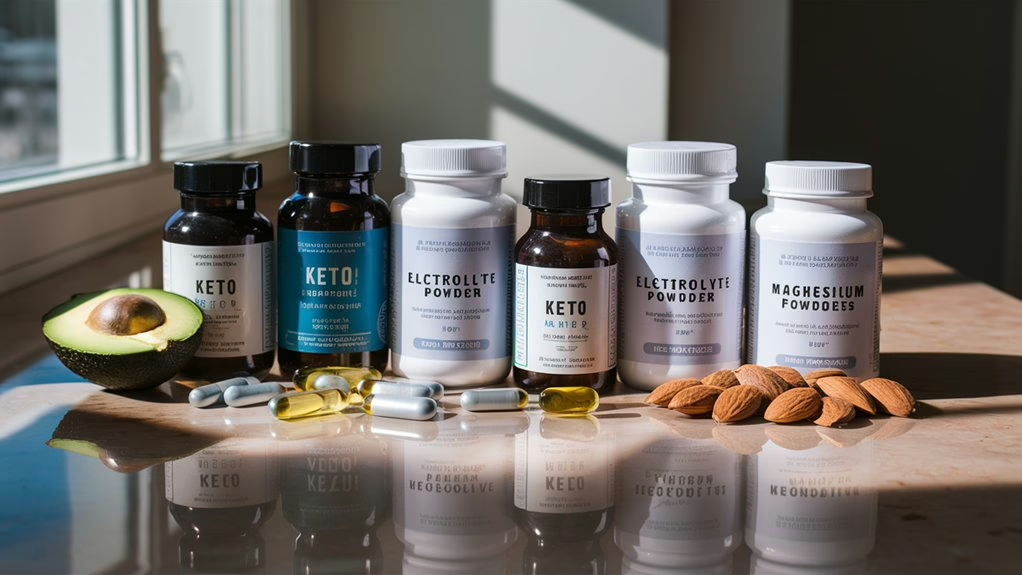While you can follow a keto diet without supplements, certain additions can make your journey more successful and comfortable. You’ll likely need electrolyte supplements during the initial weeks to prevent “keto flu” symptoms like headaches and fatigue, as your body adjusts to lower carb intake. Essential supplements include magnesium, potassium, and sodium to maintain proper electrolyte balance, while MCT oil and omega-3s can support energy levels and reduce inflammation. If you’re not consuming enough nutrient-rich whole foods like fatty fish, leafy greens, and avocados, supplements can help fill important nutritional gaps. Understanding the right supplements for your needs will enhance your keto experience.
Common Supplements for Keto Success

On the path to ketosis success, certain supplements play a crucial role in supporting your body’s adaptation to a low-carb lifestyle. When you’re starting your keto journey, you’ll want to focus on essential keto supplements that help maintain your body’s balance and prevent common side effects of the diet.
Understanding metabolic adaptation patterns helps determine which supplements will best support your ketogenic lifestyle.
Exogenous ketones are often considered a cornerstone supplement, as they’ll help you achieve ketosis more quickly and maintain steady energy levels throughout the day.
You’ll also need to pay close attention to electrolytes on keto, since the diet can cause your body to flush out essential minerals. A comprehensive electrolyte supplement that includes sodium, potassium, and magnesium will help prevent the dreaded “keto flu” symptoms, such as headaches and fatigue.
MCT oil and protein powder are also valuable additions to your supplement routine. MCT oil provides quick energy that your body can easily convert to ketones, while protein powder helps control your appetite and maintain muscle mass.
When combined with magnesium supplementation, which supports energy production and blood sugar regulation, these core supplements create a solid foundation for your keto success.
Benefits of Keto Supplementation
Now that you understand which supplements can support your keto journey, let’s explore their specific benefits. Essential supplements for keto can significantly impact your success by targeting multiple aspects of health and performance.
When you’re following a ketogenic lifestyle, these supplements can help control your appetite by reducing hunger hormones and providing sustained energy throughout the day.
The benefits extend well beyond hunger control, though. If you’re an active person, you’ll be pleased to know that keto supplements can enhance your recovery after workouts, improve your sleep quality, and help your body cope with training stress.
They’ve also shown promising results for both brain and muscle health, particularly in preventing age-related decline and supporting cognitive function.
From a broader health perspective, keto supplements may help reduce inflammation, support immune function, and even contribute to reversing metabolic syndrome.
They’re especially valuable for older adults, where research shows potential improvements in physical function and muscle strength.
Similar to high-protein diets, keto supplements can help preserve and build lean muscle mass while supporting weight management goals.
While individual results may vary, these supplements can provide valuable support when used as part of a well-planned ketogenic diet.
Electrolyte Balance on Keto

Following a ketogenic diet significantly impacts your body’s electrolyte balance, making proper mineral management crucial for success and well-being. When you reduce carbs, your insulin levels drop, causing your body to excrete more sodium and potassium through urine, especially during the first few days of keto.
You’ll need to be proactive about maintaining your electrolytes, particularly during exercise or hot weather when you’re losing minerals through sweat. To prevent imbalances, you can include electrolyte-rich foods like avocados, leafy greens, and almonds in your daily meals. Adding sea salt to your food isn’t just okay – it’s recommended to help maintain proper sodium levels.
If you’re experiencing symptoms like muscle cramps, headaches, or fatigue, you’re likely dealing with an electrolyte deficiency. You’ll want to aim for 3-7 grams of sodium daily and focus on potassium-rich foods like spinach and fish.
While supplements can help, it’s essential to track your intake and avoid overhydrating, which can dilute your electrolyte levels. Remember, getting these minerals right often resolves many common keto-related discomforts. Including healthy dietary fats like avocados and nuts can help support your metabolism while maintaining proper electrolyte balance.
When to Take Supplements
Deciding when to take supplements on a ketogenic diet depends largely on your individual needs and symptoms. During your first few weeks on keto, you’ll want to focus primarily on electrolyte supplements, especially sodium, to help prevent the dreaded keto flu and maintain proper fluid balance.
As you continue your keto journey, you’ll need to establish a consistent supplement routine based on your specific dietary patterns. For magnesium and potassium, it’s best to take these supplements throughout the day, particularly if you’re experiencing muscle cramps or fatigue.
If you’re taking omega-3s, you can incorporate these with any meal, though many people prefer taking them with breakfast to establish a routine.
For athletes and active individuals, you’ll want to time your supplements around your workouts. If you’re using MCT oil, start with small amounts and gradually increase your intake to avoid digestive issues.
Following a low-carb eating pattern can lead to significant improvements in blood sugar control and overall health outcomes.
Choosing Quality Keto Supplements

Quality supplement selection requires careful attention to formulation, absorption rates, and nutrient content when following a ketogenic diet. When choosing your supplements, you’ll want to focus on electrolyte balance, essential nutrients, and overall formulation quality to support your keto journey effectively.
Understanding how macronutrients affect metabolism helps determine which supplements best support your ketogenic lifestyle.
Start by ensuring your electrolyte supplements contain well-absorbed forms, such as magnesium citrate and potassium chloride. You’ll need about 3-5 grams of sodium, 4.7 grams of potassium, and 300-500 mg of magnesium daily to maintain proper balance and avoid the dreaded “keto flu.”
For omega-3s, look for supplements containing at least 500 mg of EPA and DHA per 1000 mg serving. If you’re considering MCT oil, start slowly to prevent digestive discomfort, and choose high-quality B-complex vitamins to support your energy metabolism.
Athletes following keto may benefit from additional supplements like creatine and BCAAs, while vegans should pay special attention to omega-3 supplementation. Remember to check with your healthcare provider before starting any new supplements, as they can help determine what’s best for your specific needs and goals.
Safety and Best Practices
When embarking on a ketogenic journey, understanding the safety aspects of keto supplements becomes crucial for your well-being. Before you start taking any supplements, you’ll need to consult with your healthcare provider, especially if you have pre-existing conditions like diabetes, kidney disease, or high blood pressure.
You should be aware that keto supplements aren’t regulated by the FDA, which means you’ll need to be extra careful about choosing quality products. Watch out for common side effects, including stomach upset, dehydration, and electrolyte imbalances, which can become serious if not properly managed.
High-protein keto supplements can put excess strain on kidneys and should be used with particular caution.
If you’re taking medications, you’ll want to discuss potential interactions with your doctor, as keto supplements can affect how some medicines work.
To stay safe while using keto supplements, you’ll need to monitor your electrolyte levels regularly and maintain a balanced diet rich in healthy fats. Don’t rely solely on supplements to achieve ketosis, and remember that they’re meant to support, not replace, a well-planned ketogenic diet.
If you experience any unusual symptoms or discomfort, you should stop taking the supplements and consult your healthcare provider immediately.
Natural Sources Vs Supplements

Understanding the difference between natural food sources and supplements is crucial for maintaining optimal nutrition on a ketogenic diet. While you can get many essential nutrients from whole foods, sometimes supplements become necessary to fill important gaps in your daily intake.
Your first choice should always be natural food sources, as they provide nutrients in their most bioavailable forms. You’ll find electrolytes in leafy greens and avocados, omega-3s in fatty fish like salmon and mackerel, and vitamin D in fish and fortified dairy products.
However, getting enough of these nutrients solely from food can be challenging on a keto diet, especially during the initial adaptation phase. That’s where supplements come in handy. If you’re not regularly eating fish, an omega-3 supplement might be necessary.
Similarly, you may need electrolyte supplements to prevent keto flu symptoms, particularly if you’re experiencing muscle cramps or fatigue. When it comes to vitamin D, supplementation is often recommended, especially if you don’t get much sun exposure.
The key is to track your nutrient intake using apps like Carb Manager, and work with your healthcare provider to determine which supplements you truly need.
Just as those with gluten sensitivity may require specific supplementation, keto dieters should assess their individual needs based on their dietary restrictions and health goals.
While keto supplements can support your low-carb journey, they’re not always necessary for everyone. You’ll find that focusing on whole, nutrient-rich foods should be your primary strategy, with supplements serving as helpful backup when needed. Remember to consult your healthcare provider before starting any supplement regimen and always prioritize a well-balanced keto diet. With careful planning and attention to your body’s signals, you’ll know if supplements are right for you.



